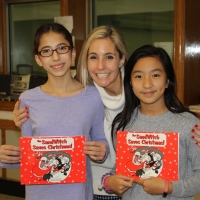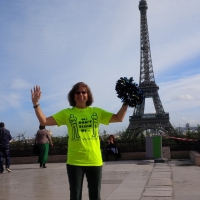My daughter is only five years old; she’s in kindergarten.
The other day we were watching the news and there was a story about a fire that occurred in my old neighborhood in Brooklyn. Tragically, two people perished in the fire.

My daughter, overhearing the story, asked me,
“Two people — that’s a small number right?”
This blog post should end right here…
What can you say — about a comment like that — from a five-year-old?
And she’s MY five-year-old.
I’m wondering if I should even be embarrassed to report that she said this. But, she’s five years old. Five year olds say the strangest things. The other day she asked me, “Daddy do you know what Santa’s sleigh is made of, it’s made of wood and magic.” So before I get myself worked up over an offhand remark made by a kid in kindergarten, let me try to find some perspective on this.
Her remark has me thinking about the impacts of recent tragic events on schools and on the children in them. When the terrorist attacks occurred in Paris, our school’s response was to observe a moment of silence out of respect for the victims. Because we share the facility, the high school principal and I got on the public address and made a few remarks; then we played the French national anthem. We also sent to staff an email with guidance on how to talk to students about tragic events.
These responses made rational sense but I am left with so my questions:
Are our kids scared, or are we scared? Don’t forget, middle school kids weren’t even alive on September 11, 2001. When we prepare to discuss tragic event with our kids, to what extent are we making assumptions about their feelings and perspectives. From our study of psychology we know of the existence of “mirror neurons” in the brain that respond the  same whether we witness an event second-hand or if we experienced it ourselves (Bergin and Bergin, 2015). Kids tend to mirror our emotional states. Are we making our kids anxious by our discussions of these events and/or by our demeanor when we do?
same whether we witness an event second-hand or if we experienced it ourselves (Bergin and Bergin, 2015). Kids tend to mirror our emotional states. Are we making our kids anxious by our discussions of these events and/or by our demeanor when we do?
How aware are our students about what’s happening? I know in my household, when major events like this happen, my wife (@dmgately) and I will have the TV running constantly. We’re both educators and we know we have a responsibility to stay abreast of events in the news. We know it will be our responsibility to stay up to date on the details of these incidents. But does everybody do this? Perhaps that Monday after the Paris attacks, many of our students were first learning of it when we got on the public address system to make an announcement and observe a moment of silence. That day I sent an email to parents letting them know that we had observed a moment of silence. We do this whenever there are discussions at school or events that parents can follow up on at home, to help them have discussions with their children. But this had me wondering if there were parents who have been trying to shield their children from these events, parents who regretted that we had these discussions, that announcements were made. I didn’t have any phone calls from parents but… Are our middle school children too young to be confronted with this? What age is old enough? In our school, kids are 10, 11, 12, 13 and maybe 14 years old. Certainly this is old enough to start grappling with complex issues and the reality of current events, but how much is the right amount to share?
 What is the role of the school? Of course we have a role in helping children understand current events and find academic connections. But are there occasions when it’s just too much? Is the tragic reality of these violent episodes too much for a typical 12-year-old to handle? No one would disagree that the school should be a safe place for kids to learn and grow. Should school be a refuge from these anxieties? Does bringing these discussions into the classroom undermine the sense of safety we strive mightily to preserve?
What is the role of the school? Of course we have a role in helping children understand current events and find academic connections. But are there occasions when it’s just too much? Is the tragic reality of these violent episodes too much for a typical 12-year-old to handle? No one would disagree that the school should be a safe place for kids to learn and grow. Should school be a refuge from these anxieties? Does bringing these discussions into the classroom undermine the sense of safety we strive mightily to preserve?
What about my Muslim students? There has been some ugly rhetoric coming from numerous sources in the media, including from those who are charged with leadership. How does this make these youngsters feel? Do my Muslim students still feel like they belong and they are valued at our school? And should we give these students an opportunity to share their voices, their unique narratives? My instinct tells me yes, but might this not be the best thing to do either. Might this make a Muslin child attract undue attention at a sensitive time?
Right now, I have more questions than answers. I’m grappling with these challenging questions constantly as an educator and school leader. I would love to hear your thoughts… and maybe some answers.
And about my daughter… when my wife and I heard her statement, we sat her down and talked about it. We told her that all lives are precious, it doesn’t matter how many lives are lost … it’s always terribly sad.
Reference
Bergin, C. C., & Bergin, D. A. (2011). Child and adolescent development in your classroom. Stamford, CT: Cengage Learning.





It’s important to realize that students who already know what happened may get an unbalanced picture of the situation from home. Not that those at home are wrong, but their views may not be consistent with what we are striving for in our school.
You raised some great questions and I hope that I consider them before I bring up any future tragic events.
Thanks for the thoughtful read Brendan!
Wow, this is a VERY emotional article. What an awesome insight on speaking with children with tragedies.
Thanks for reading Theresa…